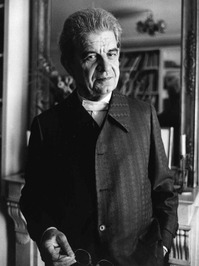Christianity is Unrest
There are a lot of us who look to religion as a source of comfort and security. It makes sense because we all feel a sense of dis-ease in our lives. We all are looking for stability and an anchor. We all need a steady foundation to jump off from into this world of adventure.
The problem is that Christianity is not, despite what it looks like, a traditional religion. It is the one religion that attempts to dismantle religion by undercutting the notion that religion saves. It is, as Christians say, Grace that saves us - not our own actions or works.
If Christianity is not a traditional religion that attempts to get people to do the right things in order to save themselves, what is Christianity? Søren Kierkegaard called Christianity a state of unrest. That may only be mildly surprising. Perhaps you have heard it said that Christianity comforts the afflicted and afflicts the comfortable? Hearing that Christianity is really a state of unrest is not what is necessarily notable here.
What is notable is what Kierkegaard points out to us: this unrest is initiated by God: “Christianity is the most intensive and strongest form of unrest thinkable. Christ’s coming is intended to disturb life. Where one wants to become a Christian, there will be unrest; and where one has become a Christian, there unrest follows.”
Here we are confronted with the idea that God is the one who gives us this unrest. But why? Why would God initiate a state of unrest in us? I thought God was in the work of rest and peace not unrest and restlessness.
It is this state of unrest that is the engine of our lives. The unrest is the point. The point is to see that in all of life, the thing that gives energy to us all, is an unrest or what we might call a contradiction. No matter where you look, outside or within, contradiction is woven into the fabric of creation. We are busy trying to root out this unrest/contradiction all the while the fabric frays. The more we try to root out the unrest or contradiction in our lives, the more it will explode in the world and many times it explodes in unhealthy ways. You see the unrest is the very engine of our lives, it is the thing that gives us energy. Until we come to peace with the unrest in our lives then we will erupt with violence.
Giving What You Don't Have To Someone Who Doesn't Want It
Philosopher Jacques Lacan said that love is giving what you don’t have to someone who doesn’t want it. If I were to create a non-nonsensical statement that I think a stereotypical philosopher would say, this is just about perfect.
What the heck does this mean? How can I give what I don’t have? And how is it loving to give this non-possession to someone who does not want it? I have been handed many flyers only to resent the one giving me what I now consider a scrap of trash to throw away. I did not want it and yet I am holding it. I don’t think that is love.
I have not read Lacan. I am not that smart. However, this definition of love is right in line with the Gospel.
First of all, that which we do not have goes by another name. It is what we lack. Thus, giving what you lack to someone is a practice of vulnerability and trust. When I am vulnerable to someone and give my lack (lack of confidence or lack of “having it all together” for instance) the other person is offered what I don’t have.
Now, when this other person is offered what I don’t have the other person probably was not looking for it. I cannot imagine that people on dating sites are putting in their profile, “I am looking for someone who is broken and lacking in the following ways…” Of course not. When we set out to find a partner, we are typically looking for someone who “completes us” or “fills us” or adds to our life in any number of ways. We look for someone who is the “total package”. We are not looking for lack.
And yet, when we meet someone who offers what were not looking for we have a choice. We can reject it - we were not looking for this to begin with - or we can receive it. In receiving the other person’s lack or brokenness we receive the very thing we did not think we wanted.
This is love.
We see this in the Christian communion. Jesus offers his broken body, his lack, to the world. In turn we are given a choice. Do we receive this broken body of the Christ or do we reject it? Christ offers us not his strength or wholeness, but his weakness and brokenness.
Some find it difficult to imagine that Christ was weak or broken or lacking in anything. I get it, who wants to worship a weak God?
However, this the the point. We are looking for a strong God, we are not looking for a weak God.
By offering the very thing we did not think we want (a weak, broken and crucified God) we encounter what love looks and feels like. When we reject the weakness and brokenness of God, then we reject the very gift of God to us.
Just as God, who needs nothing, receives our lack and brokenness as the way to love us. God responds in kind by offering God’s brokenness.
The question is not is God broken or lacking, but what will you and I choose to do with the brokenness of God offered to us?

Be the change by Jason Valendy is licensed under a Creative Commons Attribution-NonCommercial-ShareAlike 3.0 Unported License.



